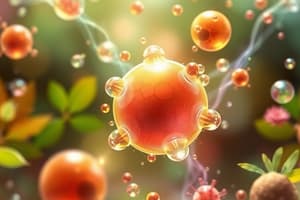Podcast
Questions and Answers
Which type of bond involves sharing or donating electrons between atoms?
Which type of bond involves sharing or donating electrons between atoms?
- Covalent Bond
- Ionic Bond
- Metallic Bond
- All of the above (correct)
Bonding forces are responsible for holding atoms together in solids.
Bonding forces are responsible for holding atoms together in solids.
True (A)
What are the two important aspects of atomic packing?
What are the two important aspects of atomic packing?
the number of bonds per unit area and the bond angle
What do metallic bonds involve?
What do metallic bonds involve?
The process of holding atoms together in solids is called ___.
The process of holding atoms together in solids is called ___.
Match the following types of bonds with their characteristics:
Match the following types of bonds with their characteristics:
What is the significance of potential energy vs. interatomic distance?
What is the significance of potential energy vs. interatomic distance?
Study Notes
Nanoscale Materials Chemistry
- Course: Nanoscale Materials Chemistry (21NTC201J)
- Instructor: Dr. Venkata Ravindra A, Assistant Professor at SRM Institute of Science and Technology
- Contact: [email protected], Phone: 8019448666
Unit I: Chemistry of Nanoparticles' Synthesis
- Focus on the interaction of chemical bonding and surface properties.
- Key topics include:
- Types of bonds: metallic, ionic, covalent, and van der Waals.
- Concepts of surface energy and chemical potential as related to curvature.
- Electrostatic stabilization and surface charge density.
- Electric potential near solid surfaces and van der Waals attraction potential.
- DLVO theory and steric stabilization in nanomaterials.
- The influence of kinetic energy on the properties of nanomaterials.
Chemical Bonding
- 118 elements can create millions of chemical compounds through chemical bonding.
- Bonds between atoms lead to new substances with significantly different properties.
- Bonding forces are essential for the stability of solids, governed by potential energy.
Atomic Bonding
- Materials consist of atoms connected by interatomic bonds, which determine material properties.
- Different types of atomic bonds yield diverse material characteristics, e.g., graphite vs. diamond.
- Atomic packing factors include bonds per unit area and bond angles.
Primary Bonds
- Primary bonds form through sharing or donating electrons, aiming for a stable electron configuration.
- Most elements, except inert gases, possess unfilled valence shells prompting bond formation.
- Example: Sodium loses an electron to achieve a full outer shell, while chlorine gains one.
Metallic Bonds
- Metallic bonds are responsible for the properties of metals, differing from covalent and ionic bonds.
- In metallic bonds, electrons are delocalized, allowing them to move freely amongst metal nuclei.
- This delocalization lends metals unique properties, such as:
- Excellent thermal and electrical conductivity.
- High melting points.
- Malleability due to the "sea" of electrons surrounding metal atoms.
Studying That Suits You
Use AI to generate personalized quizzes and flashcards to suit your learning preferences.
Related Documents
Description
Test your knowledge on the chemistry of nanoparticles' synthesis in this quiz. It covers topics such as types of chemical bonds, surface energy, and stabilization methods in nanomaterials. Brush up on key concepts like DLVO theory and the impact of kinetic energy on nanomaterials' properties.




